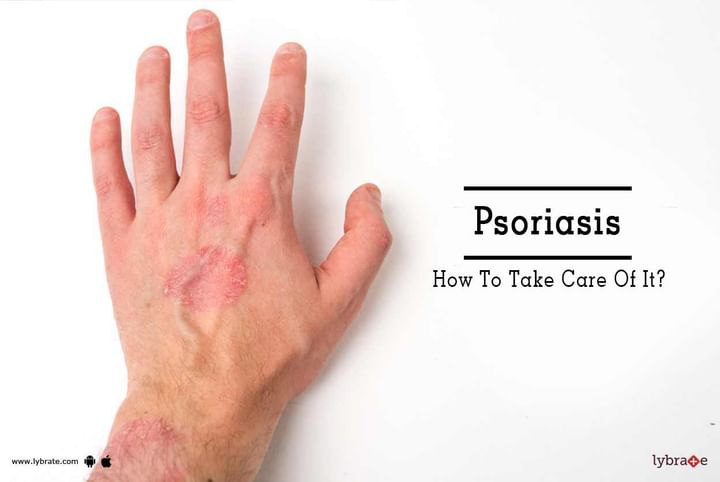Psoriasis - How To Take Care Of It?
Around three percent of the world population is affected by chronic skin disorder Psoriasis, which is triggered by an overactive immune system. Primarily affecting adults, the most common type of the condition is plaque psoriasis and is seen in people suffering from high blood sugar, heart disorders, and obesity.
The symptoms of the disease may vary from one individual to another, and the most common ones include red skin, scaling of the skin, and flakes coming out of areas such as knees, elbows, and scalp.
Understanding the condition
Psoriasis can be of various types, plaque psoriasis, guttate psoriasis, and inverse psoriasis to mention a few. When the entire surface of the skin is affected by the condition, it is called erythrodermic psoriasis while palmoplantar psoriasis affects the palms and causes sores. Nail psoriasis causes yellow pitted nails which are often misdiagnosed with nail fungus.
In recent times, it has been found that people with psoriasis tend to have high blood sugar, high blood lipids, and different types of cardiovascular diseases. Around forty percent of the Psoriasis patients also experience symptoms of arthritis such as inflammation in the joints. In such cases, the disease is termed as psoriatic arthritis.
Psoriasis facts
- Psoriasis is a chronic, inflammatory skin disease.
- Psoriasis is related to inherited genes in some cases.
- The most common form of psoriasis is plaque psoriasis.
- Diabetes, obesity, and heart disease are common in people with psoriasis.
- Psoriasis is not contagious.
- Psoriasis can be initiated by certain environmental triggers.
- Psoriasis gets better and worse spontaneously and can have periodic remissions (clear skin).
- Psoriasis is controllable with medication.
Know the signs of psoriasis
Patients suffering from psoriasis may experience symptoms such as
- Itchy skin of knees, scalp, or whichever area is infected.
- White scales on the skin.
- In case the nails are affected, they will become discolored and separate easily from nail bed.
- In the case of pustular psoriasis, the patient will have tint skin pustulates with cracked and scaly skin.
- Redness of skin.
What are the common types of psoriasis?
- Guttate Psoriasis - Commonly affects children and young adults, but the total rate is less than 2%. People affected by it displays symptoms such as pink or red spots. It mostly affects the thighs, upper arms and scalp area.
- Inverse Psoriasis - This type of psoriasis showcases red but smooth and shiny scaleless skin. It mostly affects areas such as groin, armpits, skin folds and area under the breast.
- Plaque Psoriasis - The most common type of psoriasis is the plague type and displays symptoms such as red skin with silvery and white scales. Lower back, elbows, knees, and scalp are some of the areas affected by it.
- Erythrodermic Psoriasis - This is the least common type of psoriasis, however, is the most serious type. Severe itching of the skin along with peeling and burning sensation are some of the signs of this type of psoriasis
- Pustular Psoriasis - Again, a not so common type of psoriasis and mostly affects adults and is not infectious in nature. It can lead to a fast heartbeat, fever, chills, nausea along with muscle weakness.
What can cause Psoriasis?
The exact cause of psoriasis cannot be pinpointed. Various elements ranging from genetic predisposition to environmental factors can be involved in causing the disease. It is found that psoriasis affects individuals of the same family even though it is not contagious.
Psoriasis may also be caused when immune system regulation becomes defective, where the white blood cells known as T cells start targeting the healthy cells instead of attacking unwanted foreign substances. Even though so many factors have come to the fore, the precise cause of psoriasis is still not known.
Treating Psoriasis
At times, it becomes difficult to differentiate between eczematous dermatitis from psoriasis. In such cases, a biopsy may be required for distinguishing between the two conditions.
Some effective treatment options are:
- Topical treatments that include salicylic acid ointment, steroid-based creams, and use of ointments containing Vitamin D and Vitamin A.
- Light therapy – Doctors may prescribe PUVA or PUVB which can help in treating Psoriasis. Also, narrow-band UVB therapy is considered to be more effective.
- Oral and injectable drugs – Several medications that include Methotrexate, oral retinoids, and biologics that control the immune response of the body are used to treat Psoriasis when other treatments fail to improve the condition.
Lifestyle and home remedies
Although self-help measures won't cure psoriasis, they may help improve the appearance and feel of damaged skin. These measures may benefit you:
- Take daily baths.
- Use moisturizer.
- Expose your skin to small amounts of sunlight.
- Avoid drinking alcohol.
Several treatments are available to manage the condition however, the disease is chronic, and the symptoms can be best managed with the assistance of a dermatologist.



+1.svg)
